英语:Module 12
外研版英语九上Module12《Saveourworld》模块说课稿

外研版英语九上Module 12《Save our world》模块说课稿一. 教材分析《外研版英语九上Module 12 Save our world》是一篇关于环保的课文,主要讨论了全球环境问题以及我们每个人应该如何为保护地球环境做出贡献。
本模块包括三个部分:阅读理解、词汇学习和语法讲解。
通过本模块的学习,学生可以提高自己的阅读理解能力,扩展词汇量和语法知识,同时增强环保意识。
二. 学情分析九年级的学生已经具备了一定的英语基础,能够理解和运用所学知识进行简单的交流。
但是,对于一些复杂的环保相关词汇和语法结构,学生可能还需要进一步的引导和帮助。
此外,学生可能对环保这个主题有一定的了解,但深入的知识和实际操作能力还有待提高。
三. 说教学目标1.知识目标:学生能够理解Module 12中的阅读材料,掌握相关环保词汇和语法结构。
2.能力目标:学生能够运用所学知识进行环保主题的阅读理解和写作。
3.情感目标:学生能够提高环保意识,意识到自己每个人都有责任保护地球环境。
四. 说教学重难点1.重点:学生能够理解和运用Module 12中的阅读材料,掌握相关环保词汇和语法结构。
2.难点:学生能够运用所学知识进行环保主题的阅读理解和写作。
五. 说教学方法与手段1.教学方法:采用任务驱动法,让学生在实际操作中学习和运用知识。
2.教学手段:利用多媒体课件和网络资源,丰富教学内容和形式。
六. 说教学过程1.引入:通过展示一些环保问题的图片,引导学生思考环保的重要性,激发学生的学习兴趣。
2.阅读理解:学生阅读Module 12的阅读材料,回答相关问题,教师引导学生进行讨论和解答。
3.词汇学习:学生学习Module 12中的环保相关词汇,教师进行解释和例句展示。
4.语法讲解:教师讲解Module 12中的相关语法结构,学生进行练习和应用。
5.小组讨论:学生分组讨论如何为保护地球环境做出贡献,每组给出具体的建议。
6.写作练习:学生根据所学知识和讨论结果,撰写一篇关于环保的短文。
外研版英语八年级上册 Module 12 Unit 2

3 Read the passage and check your answer to Activity 2.
What to do in an earthquake
提醒
Earthquakes always happen suddenly, so it is difficult to warn people about them. Usually people have little or no idea about what to do during an earthquake, so here is some advice:
5 On a beach, run away from the sea and move quickly to higher ground. In short, follow what you learnt in school.
You can be safe and you can also help save others.
2 Do not stand near street lights or under power
lines.
远离……
3 Stay away from bridges and trees. If you are in a
bus or a car, stay in it.
当心……
4 In the mountains, be careful of falling rocks.
shaking, but do not use the lift.
4 Keep calm, especially when you are with other
people. Be brave and be helpful.
Module12Unit3Languageinuse-语法22-23外研版英语九年级上册
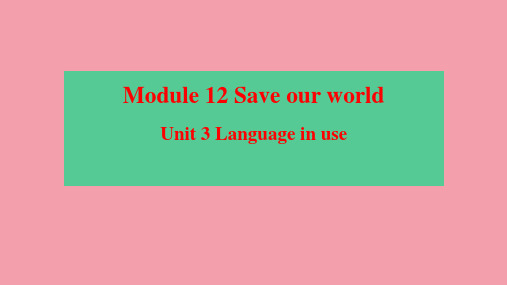
careful careless collectable hopeful hopeless impossible reuse usable useful useless unusual unwanted wasteful
后缀:
常见的后缀:
1. –able表示“可能,易于,适合于”, 构成形容词,
如:renewable, eatable(可吃的),enjoyable
2. –ful表示“充满……的,具有……性的”, 构成 形容词,如:helpful, hopeful, powerful , useful, reful, beautiful
musician building, painting, shopping
artist, scientist agreement, government coldness, happiness, illness
truth, warmth
competition, education, information
someone by post. 2 A __c_la_s_s_r_o_o_m_ is a room where you have classes at school. 3 A _s_t_o_r_y_b_o_o_k__ is a book that has one or more stories for children. 4 A _b_l_a_c_k_b_o_a_r_d__ is a black board that is used at school for writing on with chalk.
外研版英语七年级下册Module12Unit1+It's+so+beautiful+课件

He doesn't like music, does he? 他不喜欢音乐,是吗? Mike is English, isn't he? 迈克是英国人,不是吗? 【即时活用】
( C )1.I don't think the newly directed film by Zhao Wei is as
必背佳句 请在课文中找出下列句型并熟记 1.Is this by Strauss or Mozart?这是施特劳斯的(曲子)还是 莫扎特的(曲子)? 2.Do you like traditional Western music or pop music, Betty? 贝蒂,你喜欢传统西方音乐还是流行音乐?
( T )5.Lingling enjoys Beijing Opera very much.
二、听填信息 请听教材P72 Activity 3 Listen and read的对话录音,完成下 列信息表。
name
like / doesn't like
Tony likes 1.___r_o_c_k__ music
Lingling likes 2.___p_o_p__ music and Beijing 3.__O__p_e_r_a__
Betty likes 4.____tr_a_d_i_t_io_n_a_l___ Western music and pop music
doesn't like rock music, because it is so 5.___n_o_i_s_y__ Daming
interesting as people say, ________.
A.do I
B.don't I
外研版英语八年级上册module12单词速记法
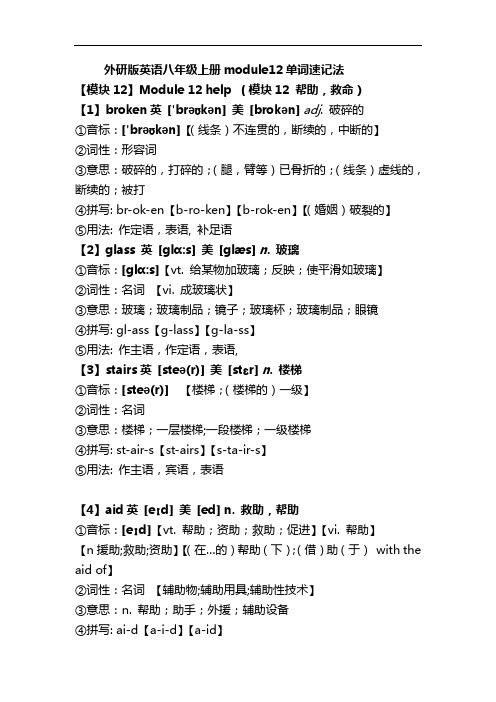
外研版英语八年级上册module12单词速记法【模块12】Module 12 help (模块12 帮助,救命)【1】broken英['brəʊkən] 美[brokən] adj. 破碎的①音标:['brəʊkən]【(线条)不连贯的,断续的,中断的】②词性:形容词③意思:破碎的,打碎的;(腿,臂等)已骨折的;(线条)虚线的,断续的;被打④拼写: br-ok-en【b-ro-ken】【b-rok-en】【(婚姻)破裂的】⑤用法: 作定语,表语, 补足语【2】glass 英[ɡlɑ:s] 美[ɡlæs] n. 玻璃①音标:[ɡlɑ:s]【vt. 给某物加玻璃;反映;使平滑如玻璃】②词性:名词【vi. 成玻璃状】③意思:玻璃;玻璃制品;镜子;玻璃杯;玻璃制品;眼镜④拼写: gl-ass【g-lass】【g-la-ss】⑤用法: 作主语,作定语,表语,【3】stairs英[steə(r)] 美[stɛr] n. 楼梯①音标:[steə(r)] 【楼梯;(楼梯的)一级】②词性:名词③意思:楼梯;一层楼梯;一段楼梯;一级楼梯④拼写: st-air-s【st-airs】【s-ta-ir-s】⑤用法: 作主语,宾语,表语【4】aid英[eɪd] 美[ed] n. 救助,帮助①音标:[eɪd]【vt. 帮助;资助;救助;促进】【vi. 帮助】【n援助;救助;资助】【(在…的)帮助(下);(借)助(于)with the aid of】②词性:名词【辅助物;辅助用具;辅助性技术】③意思:n. 帮助;助手;外援;辅助设备④拼写: ai-d【a-i-d】【a-id】【5】first aid英[fə:st eid] 美[fɚst ed] n. 急救①音标:[fə:st eid]【急救】②词性:名词短语③意思:急救④拼写:first aid 【f-ir-st aid 】⑤用法:作主语,宾语,表语【6】medical 英[medɪkl] 美[mɛdɪkəl] adj. 医学的,医疗的①音标:[medɪkl] 【医学的;医疗的;医术的】②词性:名词【n. 体格检查】【体格检查;体检】③意思:医学的;医药的;医疗的;内科的④拼写:med-ical【me-di-ca-l】【m-ed-ic-al】⑤用法:作表语,定语,【7】imagine英[ɪ'mædʒɪn] 美[ɪmædʒɪn]v.想象,设想①音标:[ɪ'mædʒɪn] 【vt. 想,设想;想像;料想,猜想;误认为】②词性:动词【vi. 想象;猜想,推测】③意思:想象;设想;猜测;猜想;认为;臆想;幻想④拼写:im-ag-in-e【imag-ine】【i-mag-in-e】【i-mag-in-e】⑤用法:作谓语①现在分词:imagining(用于进行时态)②一般过去式:imagined用于一般过去时态)③过去分词:imagined(用于完成时态)④动词三人称单数:imagines(一般现在时态)⑤动名词:imagining(作主语,作动词和介词宾语)【8】bottom 英['bɒtəm] 美[bɑtəm] n.底部,下端①音标:['bɒtəm]【adj. 底部的】【vi. 到达底部;建立基础】②词性:名词【vt. 装底;测量深浅;查明真相】③意思:n. 底部;末端;臀部;尽头④拼写: bo-tt-om【bot-tom】【b-ot-to-m】【9】at the bottom of英[æt ðə bɔtəm ɔv] 美[æt ði bɑtəm ʌv] 在…的底部①音标:[æt ðə bɔtəm ɔv]②词性:介词短语③意思:在…的底部④拼写:at the bottom of⑤用法:作状语,作定语【1】wrong 英[rɒŋ] 美[rɔŋ, rɑŋ] adj. 有毛病的;错误的adv.不正确地,错误地①音标:[rɒŋ]【有毛病的,失常的;错误的,不正确的;不好的,不公正的;反对的,相反的,颠倒的,背面的,里面的】【n.过失,错误;不义的行为;不义行为;犯罪】【vt. 委屈,无理地对待,诽谤】②词性:形容词/副词【不对,错误,失当;不好,不公正;逆,颠倒,翻转;有毛病,不舒服】③意思:(选择)错误的,不适宜的;(决定、选择、行动等)错误的,不适当的;有麻烦的;有问题的④拼写:w-rong【wr-on-g】⑤用法:作定语,表语,宾语【11】what’s wrong with ? [wɒts rɔŋ wɪð]] …怎么了?①音标:[wɒts rɔŋ wɪð]]②词性:特殊疑问句?③意思:怎么了?④拼写:what’s wrong with sb 【意思某人怎么了?】⑤用法:what’s wrong with +人/物【意思某人/某物怎么了?】【12】trouble [英] [trʌbl][美] [trʌbəl]on. 问题,烦恼,困难①音标:[trʌbl]【vi.费心;烦恼】②词性:代词【vt.麻烦;使烦恼;折磨】③意思:麻烦;烦恼;故障;动乱④拼写:trou-ble【tr-ou-ble】⑤用法:作主语,宾语,表语,【13】lift [英] [lift][美] [lɪft]v. 举起;抬起;提起;n.电梯①音标:[lift] 【vt.& vi.举起,抬起】【vi.消散;升起;耸立】②词性:动词/名词【vt.举起;提升;鼓舞;抬起】③意思:举[抬, 提]起;电梯;举起;起重机;搭车④拼写:l-if-t【li-ft】【li-f-t】【提;抬;举;(尤指)向上移动】⑤用法:作谓语;主语,宾语,表语,定语,①现在分词:lifting(用于进行时态)②一般过去式:lifted用于一般过去时态)③过去分词:lifted(用于完成时态)④动词三人称单数:lifts(一般现在时态)⑤动名词:lifting(作主语,作动词和介词宾语)lift raise elevate都含“举起”的意思。
Module 12 词汇检测和语法习题(含重难点提升)外研版英语七年级下册

外研版七年级下册Module12词汇检测一、根据中文写出单词二、词性变化rock(n.)摇滚乐--__________________(n.)岩石sound(n.)声音--__________________(v.)听起来violin(n.)小提琴--__________________(n.)小提琴演奏者believe(v.)--_________________(n.)信徒live(v.)活着;居住;生活--__________________(adj.)活泼的;轻快的noise(n.)噪声;吵闹声--__________________(adj.)吵闹的Western(adj.)西方的--__________________(n.)西方centre中心--__________________(adj.)中心的;主要的music(n.)音乐--__________________(n.)音乐家;乐手class(n.)班级;同学--__________________(adj.)经典的;古典的rich(adj.)富裕的--__________________(adj.)贫穷的sad(adj.)令人悲伤的;令人难过的--__________________(n.)悲伤--__________________(反义词)(adj.)快乐的Europe欧洲--__________________(adj.)欧洲的三、重点短语西方音乐_________________________考虑_________________________穿过_________________________流行音乐_________________________京剧_________________________一个...的爱好者________________________ 摇滚乐_________________________别再烦我们_________________________这么吵_________________________ 太快_________________________用来跳舞很好_________________________ 在...的中心_________________________古典音乐_________________________在十八世纪_________________________ 传统舞蹈_________________________使某人著名_________________________ 全欧洲_________________________不仅...而且..._________________________带...四处看看_________________________ 举办音乐会_________________________ 成百上千的_________________________ 许多音乐作品_________________________ 一位伟大的欧洲音乐家_________________ 是完美的_________________________ 因为...而出名_________________________和...在同一时期_______________________ 在早年_________________________ 在那时_________________________ 失聪_________________________在最后十年_________________________ 发生_________________________四、根据汉语意思完成句子,每空一词。
Module12复习学案七年级英语下册

Module 12 Western musicLearning aims:1.Reconstruct your mind map about Western music2.List different music styles and famous musicians around the world3. Pay attention to the similarities and differences between Chinese and foreign music cultures in learning and daily munication.I. Key phrases1. dance music 舞曲_____________________2 Western music. 西方音乐__________________3.go through 穿过___________________4.pop music 流行乐___________________5.in the centre of 在....的中心__________________6. play the piano 弹钢琴____________________7.play the violin 拉小提琴____________________8.give a concert 举办音乐会__________________9 .at the age of 在....岁时____________________10.take/show sb around ... 带某人参观__________________11. Beijing Opera 京剧_____________________12. the capital of Austria 奥地利首都___________________13. types of music 音乐的类型___________________14 play music 演奏音乐_____________________15.on the river 在…河畔____________________16. European classical music 欧洲古典音乐________________17.hundreds of wonderful pieces of music数以百计的美妙的乐曲________________18.traditional music 传统音乐________________________II. Key sentences1. 这是西方音乐,是吧?This is Western music, isn’t it?2.你了解他吗?Do you know anything about him?3.多么美丽的城市!What a beautiful city!4.它穿城而过维也纳。
七年级英语下册 Module 12 A holiday journey重难点讲解 外研版
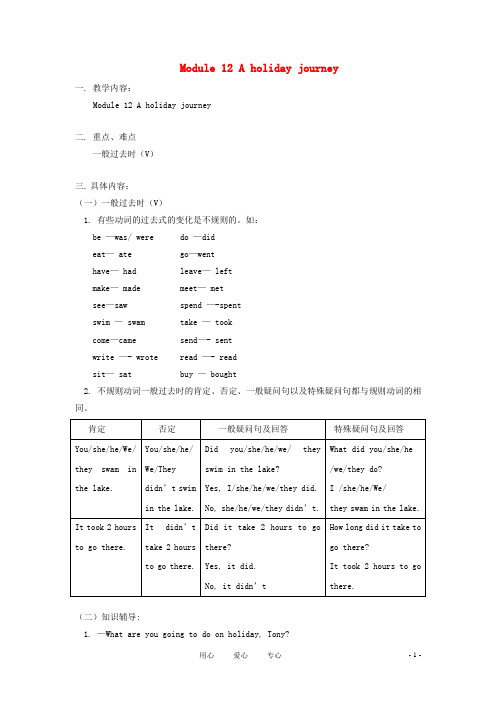
Module 12 A holiday journey一. 教学内容:Module 12 A holiday journey二. 重点、难点一般过去时(V)三.具体内容:(一)一般过去时(V)1. 有些动词的过去式的变化是不规则的。
如:be —was/ were do —dideat— ate go—wenthave— had leave— leftmake— made meet— metsee—saw spend —-spentswim — swam take — tookcome—came send—- sentwrite —- wrote read —- readsit— sat buy — bought2. 不规则动词一般过去时的肯定、否定、一般疑问句以及特殊疑问句都与规则动词的相同。
(二)知识辅导:1. —What are you going to do on holiday, Tony?—We’re going to Los Angeles.—你假期打算做什么,托尼?—我打算去洛杉矶。
洛杉矶是美国第二大城市,位于加利福尼亚州,该城市以好莱坞和迪斯尼乐园而文明于世。
be on holiday / have a holiday 在度假例如:I’m on holiday in London with my friend Jenny.我和詹妮在伦敦度假2. We had a great time. 我们玩得很高兴。
Have a great time/ good time/ enjoy oneself玩得很高兴3. How long did it take to get there? 去那里要用多长时间?It take sb. some time to do sth. 某人做某事花多长时间It takes me 2 hours to Jinan by bus yesterday.昨天我乘公共汽车去济南花了2 小时。
七年级英语下册 Module 12 Western music(词汇篇)试题 (新版)外研版

Module 12 词汇篇______________________________________________________________________________ ______________________________________________________________________________掌握重点词汇及短语并能灵活运用。
1. sound n. 声音 v. 听起来◆Hmm, the sound is very different, isn’t it?嗯,这声音很不一样,不是吗?◆How sweet the music sounds!这音乐听起来多悦耳!【探究总结】 sound与noise和voice的区别如下:词汇词义用法sound 声音泛指任何声音,不论其高低、是否悦耳等noise 噪音指的是人们不愿听到的声音或嘈杂声voice 声音;嗓音指人说话或歌唱等的嗓音2. through prep. 穿过◆It goes through many cities.它穿过许多城市。
◆The old man walked across the road.这位老人走过了马路。
【探究总结】 through与across的区别词汇词义用法through 穿过;通过指(空间的)从……的一边到另一边across 横过;穿过指(表面的)从一头穿到另一头,一般与go, walk连用3. lively adj. 活泼的;轻快的◆This piece of music sounds very lively.这首曲子听起来很轻快。
◆Lucy is a lively gir l.露西是一个活泼的女孩。
◆ Is the snake living?那条蛇还活着吗?【探究总结】lively 的用法22(1)lively虽然以-ly结尾, 但其词性为形容词, 在句中可以作定语、表语或宾语补足语。
外研版英语八年级上册 Module 12 Help
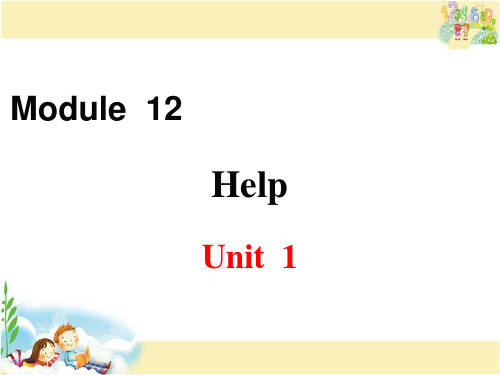
eg. She couldn't imagine living in a place like
that...
Post-reading
2. But he could have trouble hearing you or speaking to you.
他可能在学习英语方面有困难。 He could have trouble learning English. Maria 可能找工作有困难。 Maria could have trouble finding a job.
Pre-reading
What should you do if someone falls down the stairs?
• Call 120 • Take him to
the hospital •…
While-reading
Read and answer the questions.
• 1.What is the conversation mainly about? It’s about first aid , or giving someone basic medical help .
While-reading
What should you do when you break your bones?
Remove(移开) clothing from the broken parts. You may need to cut clothing off with scissors to prevent causing your child any unnecessary pain. Provide a cold compress or ice pack wrapped in cloth. Do not put it directly on the skin. Place something firm (硬) (like a board or rolledup newspapers) next to the injured part Don't eat, in case first aid is needed.
外研版英语七年级下册Module12课文+知识点
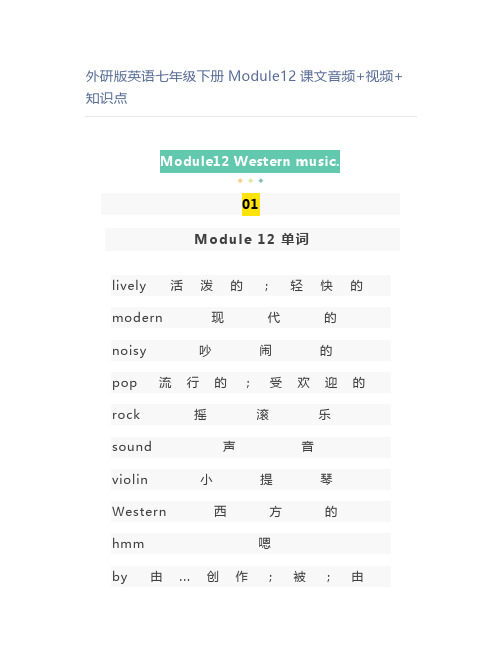
外研版英语七年级下册Module12课文音频+视频+知识点◆◆◆01Module 12 单词lively 活泼的;轻快的modern 现代的noisy 吵闹的pop 流行的;受欢迎的rock 摇滚乐sound 声音violin 小提琴Western 西方的hmm 嗯by 由...创作;被;由through 穿过both 两个;两者opera 歌剧voice 声音drum 鼓believe 相信musician 乐手;音乐家centre 叫心European 欧洲的classical 经典的century 世纪composer 作曲家elder 年长的waltz 华尔兹舞(曲)dance music 舞曲another 又一个;再一个piece (写作或艺术)作品poor 贫穷的perfect 完美的sad 令人悲伤(难过)的slow 慢的feel 感觉;觉得ship 船02Module 12课文动画外研版七年级下册Module 12 Unit 1 课文动画外研版七年级下册Module 12 Unit 2 课文动画03Module12知识梳理【重点短语】1. Beijing Opera 京剧2. the capital of Austria 奥地利首都3. think about 认为,考虑4. pop music 流行音乐5. Western Music 西方音乐6. dance to 随着…跳舞7. the center of …的中心8. European classical music 欧洲古典音乐9. on the river 在…河畔10. hundreds of wonderful pieces of music 数以百计的美妙的乐曲11. play music 演奏音乐12. traditional music 传统音乐13. take place 发生14. at the same time 同时15. watch it on TV 在电视上观看16. types of music 音乐的类型17. the rest of 其余的...18. in the last ten years 在过去的十年里19. at that time 在那时【重点句型】1. This is Western music, isn’t it? 这是西方音乐,是吧?2. —Is this by Strauss or Mozart?这是斯特劳斯还是莫扎特的作品?—It’s by Strauss. 它是斯特劳斯的作品。
七年级英语下册知识导学Module12Westernmusic词句精讲精练

Module 12 Western music词句精讲精练词汇精讲1.livelylively作形容词,“充满活力的,活泼的,有生气的”,常用作定语或表语。
She was a lively young woman with patience and imagination.她是个充满活力的年轻女性,富有忍耐力和想象力。
He had a strange way of making his classes lively and interesting.他有一种奇妙的方法,使他的课堂生动有趣。
【拓展】辨析:lively,alive,live与living这四个词都可用作形容词,异同点如下:lively常用作定语或表语,“充满活力的,活泼的,有生气的”。
alive常作表语或后置定语,“有生命的,活的”。
He was alive when they took him to the hospital.人们把他送到医院时他还活着。
live作定语,“活的,有生命的(主要用来指鸟或其他动物);现场的,直播的”。
Look! These is a live fish in the pool.看!池子里有一条活鱼。
We watched a live television show. 我们观看了一场电视现场直播的表演。
living意为“活的,健在的”。
His grandpa is still living at the age of 96. 他爷爷96岁了,仍然健在。
2.hear(1)hear作“听见、听到”解,后面可以接名词,代词、动词-ing形式或不带to的不定式。
另外hear后面还可接宾语从句。
例如:I heard him just now. 我刚才听到了他说话。
He can hear nothing. 他什么都有听不见。
I heard him singing in the next room. 我听见他在隔壁房间里唱歌。
外研版七年级英语下册 (导)学案:Module 12 Unit 1

Module 12 Western musicUnit 1 It’s so beautiful!1.知识目标:熟记词汇:lively ,modern, beautiful, noisy, pop, rock, sound, violin2.能力目标:了解感叹句,反义疑问句和选择疑问句3.情感目标:欣赏各种类型的音乐,培养学生礼貌使用语言的意识与能力等。
【教学重难点】分析感叹句,反义疑问句和选择疑问句的结构。
【学法指导】(1)预习课文,理解意思,完成题目,找出不懂的地方。
(2)小组间合作解决不懂的地方,教师适时点拨。
【课前预习】一、英译汉。
西方音乐的种类blues_______________classical music________________jazz________________opera________________pop music________________rock music________________techno________________音乐的感觉slow__________sad____________serious_________traditional______fantastic________________dramatic________________beautiful________________lively__________noisy__________modern____________二、反意疑问句的定义:1.反意疑问句又叫附加疑问句,是指当提问的人对前面所叙述的事实不敢肯定,而需要向对方加以证实时所提出的问句。
2.结构为:前一部分是一个陈述句,后一部分是一个简单的问句(助动词/情态动词或系动词be(肯定或否定)+主语(代词)3. 反意疑问句构成应注意以下几点:①前面的陈述句如果是肯定的,反意疑问句就要用否定形式;如果是否定的,反意疑问句就用肯定形式。
外研版七年级英语下册 Module 12 Unit1 学案

Module 12 Western music Unit 1 It’s so beautiful.第一课时学案学习目标:1.跟读音频,自主预习,能根据音标读、写单词,并掌握单词对应的汉语意思,了解词性。
2.听前说,通过播放video及展示图片与学生互动,能初步了解用反意疑问句和选择疑问句表述观点。
3.听中说,通过听力并完成相应习题,能听懂并表达课文中有关音乐的话题,通过示范读及多次跟读音、视频学会语调、连读、失爆等发音现象。
4.听后说,同学之间模仿课文,对话交流,了解不同的音乐特色和音乐文化。
一、课前预习扫清障碍Task1. 根据音标能够拼读下列单词,并说出汉语意思,了解词性。
要求:1.根据听说软件跟读M12U1的单词,并背诵拼写,掌握词意,了解词性。
2.把发音有困难或不易理解的单词在课本单词表中标记出来。
音标拼写词意词性1. [saʊnd] ________ _________ _________2.[ˌvaɪəˈlɪn] ________ _________ _________3.['ɒpərə] _________ _________ _________4.[vɒɪs] _________ _________ _________5.[drʌm] _________ _________ _________6.['laɪvlɪ] ________ _________ _________7.['mɒdən] ________ _________ _________8.[ˈnɔɪzɪ] ________ _________ _________9.[pɒp] ________ _________ _________10. ['westən]________ ___________ _________11.[θruː] ________ _________ _________12.[bəʊθ] ________ _________ _________13.[bɪ'liːv] ________ _________ _________[课中点拨:noisy--- noise sound---voice Western---west both---all]Task 2. 自主预习课文,找出:音乐种类: ________________________________________选择疑问句:________________________________________反意疑问句:________________________________________感叹句:________________________________________二、话题导入文化理解T ask. Free talkA:--What do you think about traditional music?B:--I think it’s…C:--What do you think about modern music?D:--I think it’s…E:--Do you like pop music or rock music? Why?F:--Tony, you like Beijing Opera, don’t you?(Tips: 3 steps: S1:skim the questions before listen;S2: listen carefully;S3 make notes quickly)1.Which modern music does Tony like?2.What does Tony’s mum think about rock music?3.Why doesn’t Tony like traditional Western music?4.Which music does Tony’s dad think is too noisy?[课中点拨:Is this by Strauss or Mozart? by 此处意思为由……创作This is called The Blue Danube. Be called 被叫做,是被动句]Task4 : Read after the video and check the types of music the students like.Then2.too much “太多”后面+不可数名词3.too many “太多”+可数名词】Read and fill in the blanks.Daming and his friends are listening to music.It’s so _______It’s ____Strauss. He was born __ _____, the _______of_______. This music is called The Blue Danube .The Danube is a river in_____. It______ _______ Viena.Betty likes _____traditional western music _____pop music. Lingling likes______ _____,she also likes_____ ______.Tony is a_____of_____ music. Daming thinks it’s____ ______ and ____ ____fast.Task5 : Read after the video.1.Thi s i s western music, isn’t i2.I love his music!3.Do you know anything abou t him, Tony?4.n i n Vienna, the capita l o5.Wha t a beautiful city!6.Do you li ke traditional western music or po p music, Betty?7.Is this by Strauss or Mozart?四、对话交流文化碰撞Task1:complete the sentences about yourself.1.My favourite music is…2.I like it because…3.My parents like …Task 2: Work in pairs. Ask and answer questions about the music you like or don’t like.A:--What music do you like?B:--I like pop. It’s lively and good to dance to, but I don’t like rock. It’s too noisy. 五、课后练习强化巩固(一)、听录音,根据录音掌握读音规则。
外研版七年级英语下册教案Module 12 第1课时
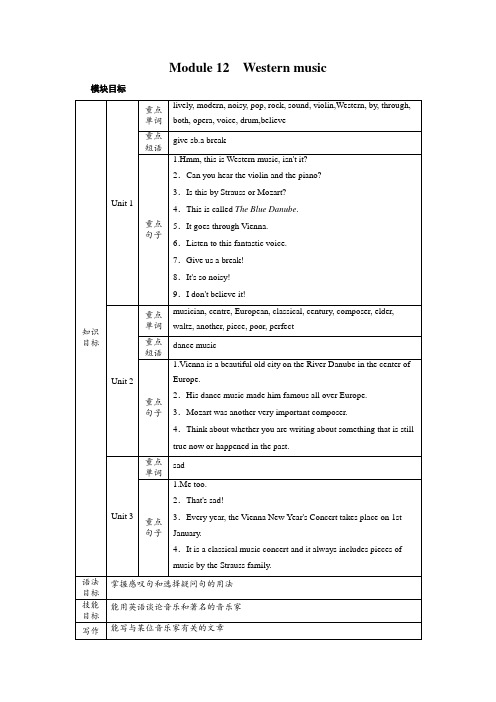
Module 12Western music 模块目标第一课时Unit 1 It's so beautiful! 单元目标自主学习根据句意及音标提示写出单词及其汉语意思。
1.We live in a modern /'mɒdən/ society.现代的2.Don't be so noisy /'nɔIzi/! Your baby brother is sleeping.吵闹的3.Do you like listening to rock /rɒk/ music? 摇滚乐4.He can play the violin /ˌvaIə'lIn/ very well.小提琴5.Her voice /vɔIs/is so sweet, isn't it? 声音教学过程环节1新课导入T:Hello, everyone! Do you like music? What kind of music do you know?S1:Yes, I like music.I like pop music best.And my favorite pop singer is Jay Chou.S2:I don't like pop music.I like soft music.Ss:...设计意图:通过对学生感兴趣的话题进行提问,能调动学生参与课堂讨论的积极性;通过师生对话互动的方式直接导入课题,起到自然过渡的作用。
环节2学习活动1-31.让学生浏览活动1方框中的单词,弄清词义,为听力做准备。
2.教师播放活动1的录音,学生听录音并按照听到的顺序给单词标序号。
教师请学生起来回答,然后核对答案。
3.让学生两人一组,根据活动1的对话内容,并围绕活动2的四个问题展开谈论。
4.教师再次播放录音,学生检查自己的答案是否正确。
教师核对答案。
5.教师播放活动3的录音,学生轻声跟读,整体感知材料内容。
外研版英语九年级上册 Module 12 Save our world 教学设计 教案
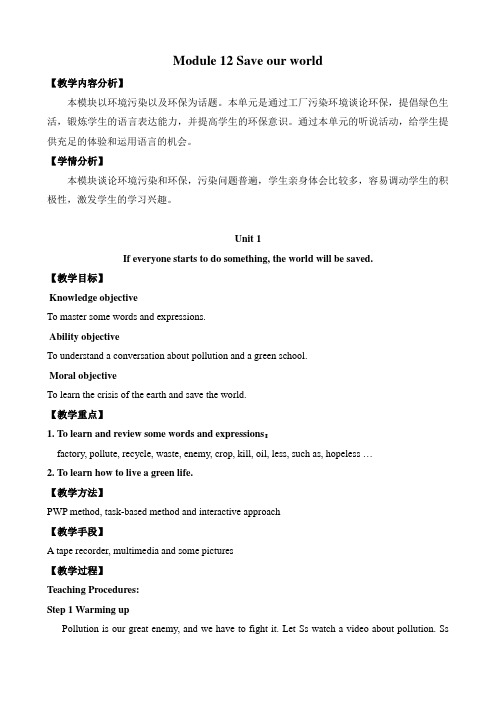
Module 12 Save our world【教学内容分析】本模块以环境污染以及环保为话题。
本单元是通过工厂污染环境谈论环保,提倡绿色生活,锻炼学生的语言表达能力,并提高学生的环保意识。
通过本单元的听说活动,给学生提供充足的体验和运用语言的机会。
【学情分析】本模块谈论环境污染和环保,污染问题普遍,学生亲身体会比较多,容易调动学生的积极性,激发学生的学习兴趣。
Unit 1If everyone starts to do something, the world will be saved.【教学目标】Knowledge objectiveTo master some words and expressions.Ability objectiveTo understand a conversation about pollution and a green school.Moral objectiveTo learn the crisis of the earth and save the world.【教学重点】1. To learn and review some words and expressions:factory, pollute, recycle, waste, enemy, crop, kill, oil, less, such as, hopeless …2. To learn how to live a green life.【教学方法】PWP method, task-based method and interactive approach【教学手段】A tape recorder, multimedia and some pictures【教学过程】Teaching Procedures:Step 1 Warming upPollution is our great enemy, and we have to fight it. Let Ss watch a video about pollution. Sslook at the pictures and talk about the questions.Step 2 ListeningWork in pairs. Look at the pictures and talk about them. Use the words in the box to help you.Step 3 Listen and complete the sentences.1. The factory is causing a lot of _____________.2. There should be some ________ to stop the pollution.3. We can _______ waste products, such as __________ and paper in a recycling centre.Listen and read.Step 4 Consolidate new wordsLook and say. Look at the pictures of new words and let the students to say as quickly as possible. Step 5 ReadingRead the dialogue and complete the notes.Pollution problems1. If the rivers are polluted, ________________________________________.2. In some places, pollution from factories ___________________________.3. The cars on the roads ________________________________________.What the students can do4. Support a green school: every class ___________ which can be ____________. Then the school _______________________ to help students ________________.5. Students learn _________________________. That means ___________.Step 6 Everyday EnglishIt’s no use …Such as …?Nice idea!Step 7 Language points1. It’s no use talking about things we can’t do.It’s no use doing sth. 做某事没有用处e.g. It’s no use complaining. 抱怨没有用处。
外研版九年级英语上册Module 12 测试 附答案
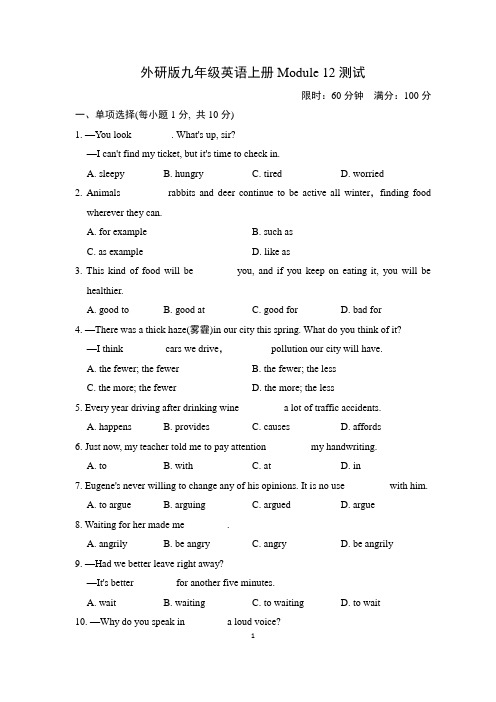
外研版九年级英语上册Module 12测试限时:60分钟满分:100分一、单项选择(每小题1分, 共10分)1. —You look________. What's up, sir?—I can't find my ticket, but it's time to check in.A. sleepyB. hungryC. tiredD. worried2. Animals ________ rabbits and deer continue to be active all winter,finding foodwherever they can.A. for exampleB. such asC. as exampleD. like as3. This kind of food will be ________you, and if you keep on eating it, you will behealthier.A. good toB. good atC. good forD. bad for4. —There was a thick haze(雾霾)in our city this spring. What do you think of it?—I think________ cars we drive,________ pollution our city will have.A. the fewer; the fewerB. the fewer; the lessC. the more; the fewerD. the more; the less5. Every year driving after drinking wine ________ a lot of traffic accidents.A. happensB. providesC. causesD. affords6. Just now, my teacher told me to pay attention ________ my handwriting.A. toB. withC. atD. in7. Eugene's never willing to change any of his opinions. It is no use ________ with him.A. to argueB. arguingC. arguedD. argue8. Waiting for her made me ________.A. angrilyB. be angryC. angryD. be angrily9. —Had we better leave right away?—It's better________ for another five minutes.A. waitB. waitingC. to waitingD. to wait10. —Why do you speak in________ a loud voice?—Because I want to make myself ________clearly.A. such; hearB. so; heardC. such; heardD. so; hear二、(荣德原创)完形填空(每小题1.5分,共15分)Starting on May 1, Beijing joined many Chinese cities by introducing a new garbage-sorting (垃圾分类) policy, People's Daily reported. Residents (居民) should sort their garbage ________11 four groups: kitchen, recyclable, hazardous (有害的) and other waste. Those who ________12 to sort their trash correctly may face fines (罚款) of up to 200 yuan, Xinhua reported.The city will also sort waste in scenic spots (景点). Schools around the city will________13 students about garbage-sorting throughout the year.The way Beijing sorts its trash sounds ________14 from cities like Shanghai, Tianjin, Wuhan and Qingdao. These cities use four different groups: wet, recyclable, harmful and dry.________15their names are different, the groups are actually the same. Wet garbage in Shanghai is, ________16, kitchen garbage. And dry garbage is the same ________17 other waste, China Youth Daily reported.There are other environmentally-friendly changes ________18 to Beijing too. Restaurants will ________19be allowed to provide disposable tableware (一次性餐具) like ________20chopsticks.Hotels and restaurants will not be allowed to provide disposable products such as toothbrushes, Xinhua noted.11. A.in B. into C. from D. of12. A. forget B. remember C. fail D. want13. A. remind B. give C. tell D. teach14. A. different B. difficult C. cool D. far15. A. Because B. Unless C. Although D. Until16. A.by the way B. in a word C. in public D. in fact17. A. from B. as C. by D. with18. A. come B. coming C. came D. comes19. A.no wonder B. no more C. no longer D. no way20. A. woolen B. golden C. wooden D. silky三、阅读理解(每小题3分,共15分)The world uses about a thousand million tons of water a day. Water is a human right and everyone should have their share. Yet more than 700 million people around the world have trouble getting clean, safe water.Treating wastewater is a good way to provide fresh water for us. And it also helps the environment by keeping waste out of rivers and oceans.80% of wastewater around the world is not treated at all, and it is running into oceans. But now we have got the technology to treat and reuse the wastewater.While 75% of our planet is covered with water, only 2% is fresh water that comes from rivers, lakes, ice and snow. The rest, 98% of the water, is in seas and oceans. It is too salty to drink. Then desalination businesses come in. More than 19,000 factories have been built around the world, mostly in coastal countries. They process (加工) more than 92 million tons of water every day. But the technology they use requires a lot of energy.Scientists are working to create a less costly technology. They want to produce 20 times more clean water and make sure everyone has enough. But for now, the world still faces each day with not having enough water for everyone.21. How many people have trouble in getting clean water around the world?A. Under 10 million.B. Only 19 million.C. About 92 million.D. Over 700 million.22. Treating wastewater helps the environment by ________.A. storing waste in ice and snowB. letting waste run into oceansC. keeping waste out of rivers and oceansD. sending waste to coastal countries23. What does the underlined word “desalination” in Paragraph 3 mean?A. 远洋运输B. 潮汐发电C. 食盐销售D. 海水淡化24. At present, the technology to process water ________.A. needs much energyB. saves much moneyC. satisfies everyoneD. causes pollution25. What can we infer from the last paragraph?A. Water should be a human right.B. The water problem is still serious.C. Our planet is covered with water.D. Everyone has enough clean water.四、词汇运用(每小题2分,共10分)根据句意及汉语提示完成句子。
外研版英语(新标准)九年级上册Module 12 Save our world Unit 1教学设计

Module 12 Save our world一、教学内容:Unit1 If everyone starts to do something, the world will besaved.二、课型:Listening and speaking三、教学目标:1、能正确运用词汇及短语:factory, pollute, recycle. waste, enemy, crop. kill, oil, less, hopeless2、语法 :能够向别人提出环保的建议。
3、能听懂有关环保的日常对话并获取信息。
4、能够自如地谈论环保等话题。
5、能够简单介绍环保措施,劝说人们增强环保意识。
四教学重难点:1、能听懂有关环保的日常对话并获取信息2、能够了解构词法。
五教学准备:查找资料,制作多媒体课件六预习要求:根据音标自学本课新单词。
达标训练题Module 12 Unit 1I.根据句意及汉语提示完成句子。
1.He has work in the_________(工厂)for ten years.2.His grandfather killed ten_________(敌人)in the war.3.The price of the_______(石油)is keeping grow.4.We must stop the factory from_______(污染)the air.5.There are________(较少数;较少量)pollution in our city.II. 根据汉语提示完成下列句子。
1.我们在担心明天的天气。
We are ______________________________the weather tomorrow.2. 空气污染已经变得越来越严重。
_____________________________________is worse and worse.3. 打架没有用处。
九年级英语外研版上册课件:Module 12 Unit 2(共29张PPT)
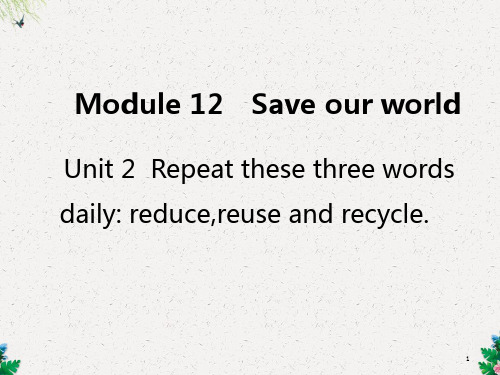
用法1 rapid作形容词,意为“快速的;迅速的”。 拓展 与rapid相关的单词
举例 He made such rapid progress.他进步很快。
19
用法2 take steps意为“采取措施;开始行动”。take steps to do sth.意为“采取措施做某事”。
举例 We must take steps to prevent this from happening again. 我们必须采取措施,以免再发生 这种事。
26
Reduce Reduce means “use less”. It saves money and causes 3.__l_e_s_s___ pollution. To achieve this, we shouldn't waste things, or order more food than we can finish. We should turn off the lights when we don't need them, and try not to buy 4.___a_n_y_t_h_i_n_g__ new unless it's really necessary.
23
三、单项填空
( D )1.I don't know ______ he will pass the exam. ______ he passes, I'll tell you.
A.if; Whether
B.whether; Whether
C.if; That
D.if; If
( C )2.We hope ______ a good time here.
应用 根据汉语意思补全下列句子,每空一词 我们能采取措施保护自己和那些我们爱的人。
- 1、下载文档前请自行甄别文档内容的完整性,平台不提供额外的编辑、内容补充、找答案等附加服务。
- 2、"仅部分预览"的文档,不可在线预览部分如存在完整性等问题,可反馈申请退款(可完整预览的文档不适用该条件!)。
- 3、如文档侵犯您的权益,请联系客服反馈,我们会尽快为您处理(人工客服工作时间:9:00-18:30)。
Read and find what Betty’s Granny did
Monday arrived by plane, went to hotel, went for a walk
Tuesday saw Big Ben and Buckingham Palace, bought some presents visited the British Museum, had
Buckingham Palace
Buckingham Palace Is it magnificent?
壮观
Big Ben
Here a group of pictures, can you guess the place?
British Museum
Hyde Park
feed food to swans
a concert in the park
ride a horse
Speakers’ Corner (演讲者之角)
Can you tell : which city are these places of interest (名胜)in?
Tower Bridge and River Thames
Read the email quickly and answer the questions.
Module 12 A holiday journey Unit 2 We didn’t see the queen.
They took a photo with their waved on the balcony(阳台) of royal(皇室) family members.
Queen Elizabeth
7.She did some shopping on Friday.
(√ )
8.Jenny went for a walk in the park. (×)
Let’s try to fill the blanks .
We’re on holiday in London. After we arrived, we _to_o_k(take) a taxi to our hotel. I w__e_n_t(go) for a walk in Hyde Park. Then we _s_aw_(see) the clock, Big Ben and other places. I _b_o_u_g_h_t (buy) some presents.
1. Who did Betty’s Granny go on holiday with?
She went on holiday with her friend Jenny.
2. Where were they on holiday?
They were on holiday in London.
3. How did they go there?
Look at the pictures. Write sentences about Daming and Lingling's holiday.
Saturday going to fly home
Read again and check the true sentences.
1.They arrived a walk in Hyde Park. (×)
3.They bought lots of presents.
Wednesday dinner in a Chinese restaurant
relaxed in the morning, went to Thursday Tower Bridge and looked at the
city
Friday
did some shopping, read the newspaper, wrote some postcards, sent some emails
( ×)
4.On Wednesday they saw Big Ben and
Buckingham Palace.
(×)
5.On Thursday they saw the River Thames
and visited Tower Bridge.
(√ )
6.Today they spent the day at the hotel. (×)
Tell us something about your last holiday. It can include(包括):
When… did you go for your holiday? Where… did you go? How… did you go? Who… was with you / went with you? When… did you leave? How long… did it take you to get there? How long… did you spend there? What… did you do there? How… was your holiday?
They went there by plane.
4. How long did they spend there?
Five days.
Listen to the email and put the places in the right order.
1 Hyde Park 3 Buckingham Palace 2 Big Ben 4 British Museum 6 Tower Bridge 5 Chinese restaurant
The next day, we _d_id_(do) some shopping and _h_a_d_(have) dinner. I _ca_m__e(come) back to the hotel and then I_w_r_o_t_e (write) some postcards and _se_n_t__(send) some emails. I _to_o_k__ (take ) lots of pictures.
